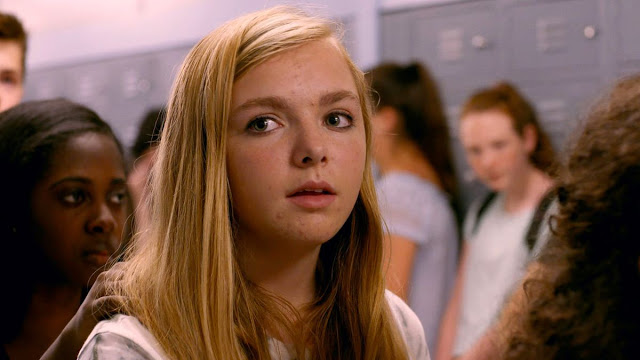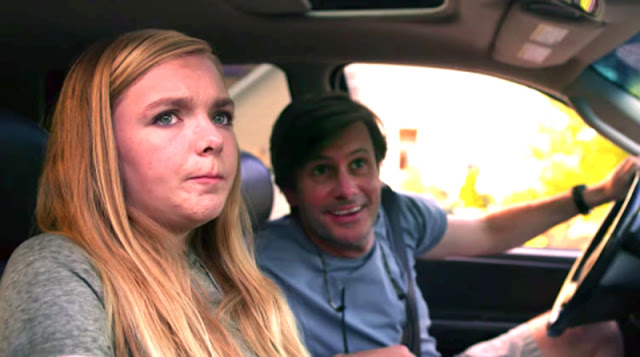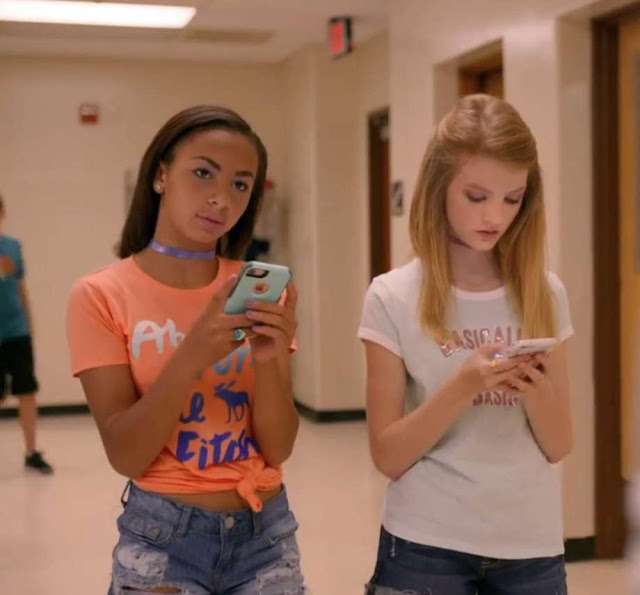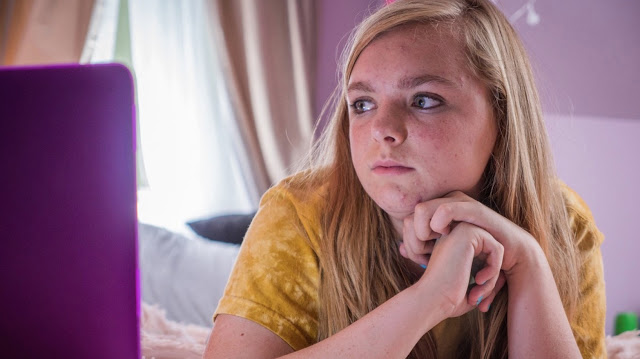Kayla, the heroine of the skin-crawling dramedy Eighth Grade, is a perfectly normal 14-year-old girl, which is another way of saying that her life is a complete disaster. She is anxious, awkward, and prone to extremities of emotion, mood swinging violently from euphoria to despair. As you watch this graceful and lovely movie, the directorial debut of the comedian Bo Burnham, you will feel compelled to envelop Kayla with affection, to promise her that everything will be OK. Of course, if you actually did that, she would likely shrink away from you and squeal in embarrassment. The only people more annoying than the kids who make Kayla miserable are the adults who try to make her feel better.
In a certain sense, Eighth Grade is a horror movie, given how it evokes memories of adolescence with ruthless clarity; you cannot experience Kayla’s tribulations without recalling the heightened agonies of your own youth. Yet one of Burnham’s smart storytelling choices is to avoid ladling on the trauma too heavily. This film is not an after-school special about bullying or self-esteem, nor is it a nauseating tale of social and sexual misadventure in the vein of Welcome to the Dollhouse. It is instead a measured, compassionate look at one teenager’s particular struggles as she suffers through one final week of middle school.
And really, how bad can things be? Kayla (a wonderful Elsie Fisher), who lives in upstate New York with her father, Mark (Josh Hamilton, in a part that echoes his role in 13 Reasons Why), is hardly rich, but she does have her own cell phone and laptop. (Her mother, by the way, is not dead but is simply out of the picture, another sound screenwriting decision that illustrates Burnham’s nimbleness at avoiding cliché.) She may not be a looker, but she’s hardly ugly, splotches of acne notwithstanding. Her teachers are pleasant to her, to the extent they acknowledge her existence. And while she’s decidedly lacking in friends, her classmates don’t so much torment her as ignore her, except when they’re awarding her the pathetic class superlative of “Most Quiet”. In the grand scheme of things, her life could be a lot worse.
Good luck telling her that. The crucial achievement of Eighth Grade is the way it captures the hothouse crucible that is young adolescence, that excruciating period when your feelings are intensely magnified, such that every tiny advancement doubles as a cloud-nine victory, and every minor setback carries the weight of life-derailing tragedy. (In this, it could be viewed as a stealth prequel to Lady Bird.) We may know that Kayla’s troubles amount to relative speed bumps on the long road to adulthood, but from her perspective, life is one momentous event after another. The movie conveys that sense of overwhelming bigness through small, insightful details, such as the way Kayla frantically paces back and forth during a phone call, or the way she breathlessly rehearses potential conversations in advance (a ridiculous behavioral trait that this critic never once engaged in during his teens, and certainly didn’t continue doing well into his 20s).
As perhaps befits his roots in comedy, Burnham’s directorial style is modest and dialogue-focused, though it isn’t without some playful flourishes; whenever Kayla lays eyes on her crush, Aiden (Luke Prael)—a blue-eyed classmate with flat abs and an even flatter vocabulary—the film shifts into music-video slo-mo, as guitars thunder on the soundtrack. Yet the movie’s most memorable conceit—a framing device in which Kayla creates a series of purported self-help YouTube videos (“Today’s topic is: being yourself!”)—is strikingly minimalist. Burnham lets these long, rambling tutorials play out in single takes, highlighting not just Fisher’s ability as an actress, but also Eighth Grade’s central theme: the gaping, often inexplicable disconnect between who we think we really are and who others perceive us to be.
But who is Kayla, really? She insists that if people just got to know her better, they’d discover that she’s fun-loving and entertaining, not just some diffident wallflower who stutters whenever anyone talks to her. Yet she’s also vulnerable to the same petty foibles that plague most young teenagers, spasms of anger and self-absorption designed to mask her own insecurity. The beauty of Fisher’s performance is that, buried beneath all the superficial worry and motormouthed stammering (Kayla’s speech patterns are littered with ums, likes, and y’knows), she conjures a teenager of genuine depth and decency who can also be a bit of a brat.
Cringingly realistic but never melodramatic, Eighth Grade is a universal telling that also takes place in this particular time, specifically as it relates to social media. Adolescence was hard enough when you saw your peers during the school day; the age of constant connectivity and perpetual phone-checking would only seem to exponentially increase the opportunities for bullying and factionalizing. Yet while Kayla is certainly attached to her phone (even after she cracks the screen when throwing it across the room in a fit of panic), Burnham doesn’t fustily posit modern teendom as a cesspit of technologically enabled agony, instead just citing Instagram and its ilk as a way to layer his generalized observations with a contemporary slant. (When a popular girl’s mom urges her daughter to send Kayla a Facebook invite to her birthday party, she snaps back, “Ugh, Mom, nobody uses Facebook anymore.”) So when Kayla concocts a plan to arrest Aiden’s attention, it may involve a secret folder on her phone, but it’s really just another sweaty fabrication rooted in the age-old feelings of desperation and confusion. (Also, as icky and helpless as Kayla’s ploy may be, the single question Aiden asks in response is far worse.)
Besides, the movie’s two most potent scenes could take place in any era. One unfolds in that bastion of teen trauma, the backseat of a car, and features a deeply disturbing game of truth-or-dare that dances up to the razor’s edge of sexual assault. The other is a sweeping exchange of monologues between Kayla and her father as they sit in their backyard, pondering her future well-being. (The car episode recalls a similar scene from The Edge of Seventeen, while the father-daughter tête-à-tête mirrors a quietly stunning moment from Michael Clayton.) The latter sequence is the kind of big swing that should almost feel out of place in a film that’s so nuanced and textured, but thanks to Burnham’s delicate script and Fisher and Hamilton’s restrained performances, it instead boldly cashes the check that the movie has spent its entire runtime writing.
Eighth Grade’s modest scope risks reducing its supporting characters to archetypes: the queen bee, the horny jock, the awkward nerd. But that’s a necessary byproduct of presenting things from Kayla’s narrow point of view. And because Burnham doesn’t frame anyone in Kayla’s orbit as truly terrible, it’s easy enough to imagine them wrestling with their own exasperating problems, and serving as the subjects of their very own movie. Perhaps years from now, they’ll watch something that reminds them of the acute torture that was growing up, and they’ll laugh wistfully at how earth-shattering everything seemed back then. It’s telling that one of the minor plot points here involves a time-capsule video, in which a younger Kayla converses with her future self. That’s a fitting device for Eighth Grade, a film that’s so effortlessly transportive, it often feels less like a movie than a time machine.
Jeremy Beck is the editor-in-chief of MovieManifesto. He watches more movies and television than he probably should.




